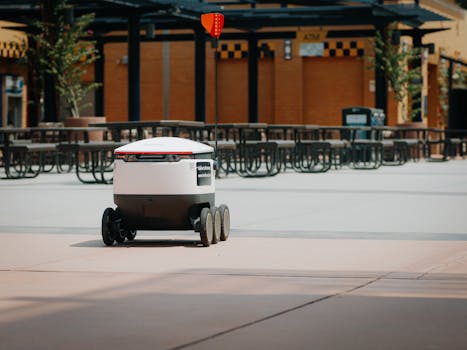happpy.news is an open source project, made with ♥ by reuben armstrong
and powered by this advert ^ from charity.marketing
Tsukuba, Japan's 'robot town', has successfully trialed self-driving buses. The technology could revolutionize public transport and reduce carbon emissions.

In a groundbreaking move towards the future of public transportation, Tsukuba, Japan, often referred to as the country's 'robot town', has successfully conducted trials of self-driving buses. These autonomous vehicles represent not only a significant technological advancement but also a potential solution to urban mobility challenges and a step towards reducing carbon emissions.
The trials, which took place over recent weeks, showcased the capabilities of self-driving technology in a real-world setting. Tsukuba is known for its commitment to robotics and innovation, making it an ideal location for such trials. The city aims to leverage these advancements to improve accessibility and efficiency in public transport systems, particularly for those who may have difficulties accessing traditional forms of transport.
One of the key advantages of self-driving buses is their potential to enhance safety on the roads. Autonomous vehicles are equipped with advanced sensors and algorithms that allow them to navigate complex environments while minimizing risks. According to experts, the implementation of self-driving technology in public transport could significantly reduce traffic accidents, which remain a major concern in many urban areas.
Moreover, the environmental benefits of self-driving buses cannot be overlooked. By transitioning to autonomous electric vehicles, cities like Tsukuba could see a substantial decrease in carbon emissions. As public transport systems evolve, the integration of green technologies will be essential in the fight against climate change. Tsukuba's trials are a promising step towards a more sustainable future, aligning with Japan's broader goals of reducing its carbon footprint.
The success of these trials could pave the way for broader adoption of self-driving technology across the country. Japan has long been a leader in technological innovation, and the move towards autonomous public transport could further solidify its position on the global stage. If successful, these trials could inspire other cities to explore similar initiatives, potentially transforming the landscape of public transportation worldwide.
Local officials and residents have expressed optimism about the potential impact of these self-driving buses. Many believe that such innovations could not only improve the convenience of public transport but also encourage more people to use buses instead of personal vehicles. This shift could lead to less congestion on the roads, improving overall urban mobility.
As Tsukuba continues to lead the way in robotics and autonomous technology, the city serves as a beacon of hope for sustainable urban development. The successful trials of self-driving buses highlight the possibilities that lie ahead as technology evolves. With ongoing support and investment, cities around the world may soon benefit from the innovations being tested in this remarkable 'robot town.'
In conclusion, Tsukuba's successful trials of self-driving buses mark a significant milestone in the journey towards a more sustainable and efficient public transport system. By embracing technology, the city is not only enhancing mobility for its residents but also contributing to a greener future. As we look ahead, the possibilities are endless, and the commitment to innovation in places like Tsukuba could inspire others to follow suit, creating a more connected and environmentally friendly world.
Source: Reuters